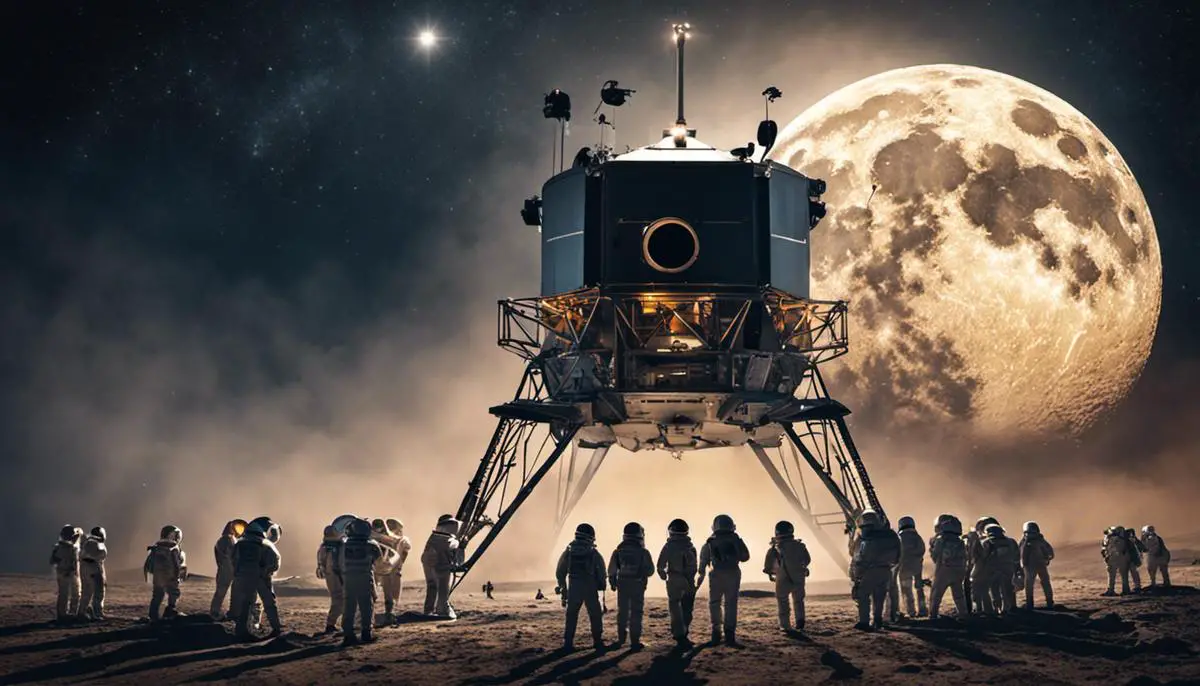The Apollo 11 moon landing in 1969 stands as a pivotal moment in history, captivating millions around the globe as Neil Armstrong took ‘a giant leap for mankind’. This tantalizing milestone greatly influenced societal perspectives, and most prominently, permeated into pop culture. The aftermath witnessed a cultural shift as the moon landing ignited newfound interest and curiosity about the cosmos, reflecting in popular literature, music, films, and television. This inspirative moment stretched the boundaries of the imaginable, providing creative individuals with a plethora of themes and concepts to explore and interpret, thereby contributing to a paradigm shift in the landscapes of literature, music, and screen.
Contents
The Immediate Effect of the Moon Landing
The Immediate Cultural Impact of the Lunar Landing: A Profound Era of Transformation
In the annals of space exploration, few events hold as much historical and cultural significance as the lunar landing on July 20, 1969. The triumphant achievement of Project Apollo’s iconic Apollo 11 mission sent immediate ripples across the global cultural landscape, heralding an era of unprecedented transformation and progress.
Crowds gathered around television sets worldwide to witness — in awe and incredulity — the momentous event, as astronauts Neil Armstrong and Buzz Aldrin took humanity’s first terrestrial steps on the lunar surface. Broadcasting such an extraordinary event live provided an unprecedented way of sharing this significant milestone with all corners of the world nearly instantaneously, in turn fostering an overwhelming sense of collective unity.
This unifying sentiment was accompanied by a profound shift in perspective referred to as the ‘overview effect.’ As film footage and still photography of Earth from the moon were aired, the planet was seen as a small, fragile entity floating in the vast expanse of the cosmos. This revelation deepened the commitment toward understanding and protecting our planet’s delicate environmental balance.
The lunar landing also sparked a wave of cultural inspiration. Pop culture rapidly integrated aspects of space into its fabric. From the evocative music albums like David Bowie’s ‘Space Oddity’ and movies such as Stanley Kubrick’s ‘2001: A Space Odyssey’, to the proliferation of the ‘Space Age’ design aesthetic with its sleek lines and futuristic appeal, the moon landing permanently etched itself onto the cultural consciousness.
Likewise, the broader field of science and technology was spurred by a newly fired public interest in space. This preceded a surge in STEM education, inspiring the younger generation to pursue fields of Technology, Science, Engineering, and Math. The dawn of microelectronics also owes its acceleration to the Apollo era, leading to modern computing power and digital communications.
Further, the moon landing fueled the Cold War competition between the United States and the Soviet Union. The moon landing marked a critical juncture in the ‘Space Race,’ bolstering American pride and a sense of dominance in technological advancement. This feat served not merely as a hopeful beacon for the future of space exploration but also as a powerful emblem of American national identity.
Yet, the lunar landing also sparked criticism and catalyzed social and political discourse. Questions of monetary expenditure, poverty, and racial inequalities were brought to the fore, thus challenging societal structures and fueling the emergence of countercultural revolution.
In conclusion, the immediate cultural impact of the moon landing transcended borders and disciplines. The unprecedented event unfolded to become a turning point in human history, provoking a significant shift in global perspectives. Space exploration, once belonging solely to the realm of imagination, emerged as a tangible testament to human capabilities and ingenuity, shaping the world in enduring ways.
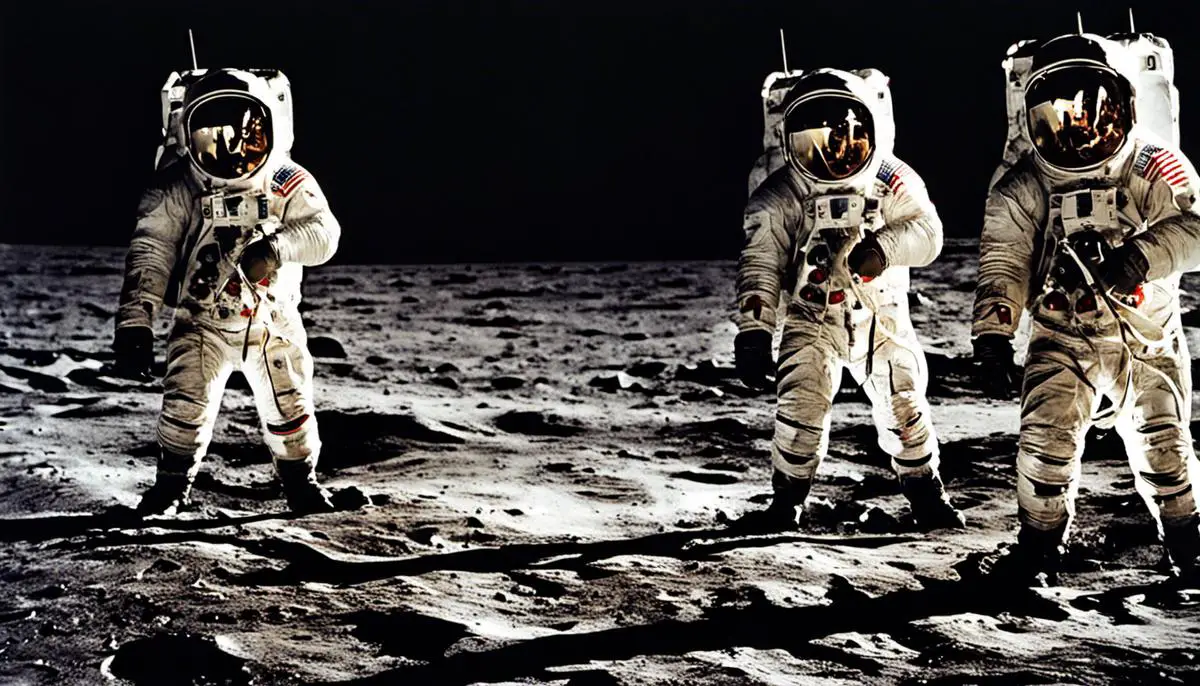
Moon Landing Influences on Film and Television
Delving deeper into the sphere of pop culture, an examination of the lunar landing’s influence on film and television uncovers a fascinating narrative.
The visual wonder of Apollo 11 opened up new domains of inspiration for storytellers, marking a pivotal moment for filmmakers and screenwriters globally.
Narratives around extraterrestrial exploration and life on distant galaxies have always been a source of curiosity, and the moon landing offered tangible ground for these concepts to manifest.
One of the most profound impacts of the lunar landing was its role in shaping the genre of science fiction.
Prior to the moon landing, sci-fi was often dismissed as outlandish or merely speculative.
The lunar landing brought credibility to sci-fi, validating themes of space exploration and fostering a renewed interest in the genre.
This influence directly led to the creation of iconic films and television series that prominently feature space exploration like “Star Trek” and “2001: A Space Odyssey”.
Furthermore, the moon landing introduced a newfound realism into filmmaking.
Prior to the event, depictions of space in film were largely fantastical.
After witnessing the moon landing, filmmakers began to emphasize accuracy and a realistic aura that may have previously been ignored.
This emphasis on realism manifested in ‘docudramas’ like “Apollo 13” and “The Right Stuff”, which not only celebrated the exhilaration of space exploration but also highlighted the grave risks involved.
The moon landing also played a crucial role in crafting narratives around international cooperation and peace.
The space race was a period of intense rivalry between competing ideologies; however, the moon landing communicated the possibility of peace in the cosmos.
This theme resonated strongly in series like “Star Trek”, where the crew consisted of an international ensemble, unveiling the possibility of unity amidst diversity in achieving common goals.
Additionally, sitcoms have utilized the moon landing as a cultural touchstone in comedic themes.
Notable shows like “The Big Bang Theory” use their intellectual protagonist’s fascination with space exploration as a constant echo throughout the series.
Similarly, “3rd Rock from the Sun” employs extraterrestrial settings to create humor and commentary on human behavior, a testament to the moon landing’s reach into various genres and formats of storytelling.
The moon landing’s iconic dialogue, “That’s one small step for man, one giant leap for mankind,” has transcended its historic context to become a classic line in film and television.
It is utilized as a metaphor for significant breakthroughs, milestones, or paradigm shifts, illustrating the event’s lasting legacy on scripting.
The lunar landing, thus, has become a multi-faceted influence on film and television, from genre inspiration to character development, from narrative arcs to dialogue formulation.
Conclusively, the moon landing’s influence stretched far beyond the realm of scientific achievement, permeating the fabric of our storytelling and shaping how we perceive and represent cosmic exploration in media.
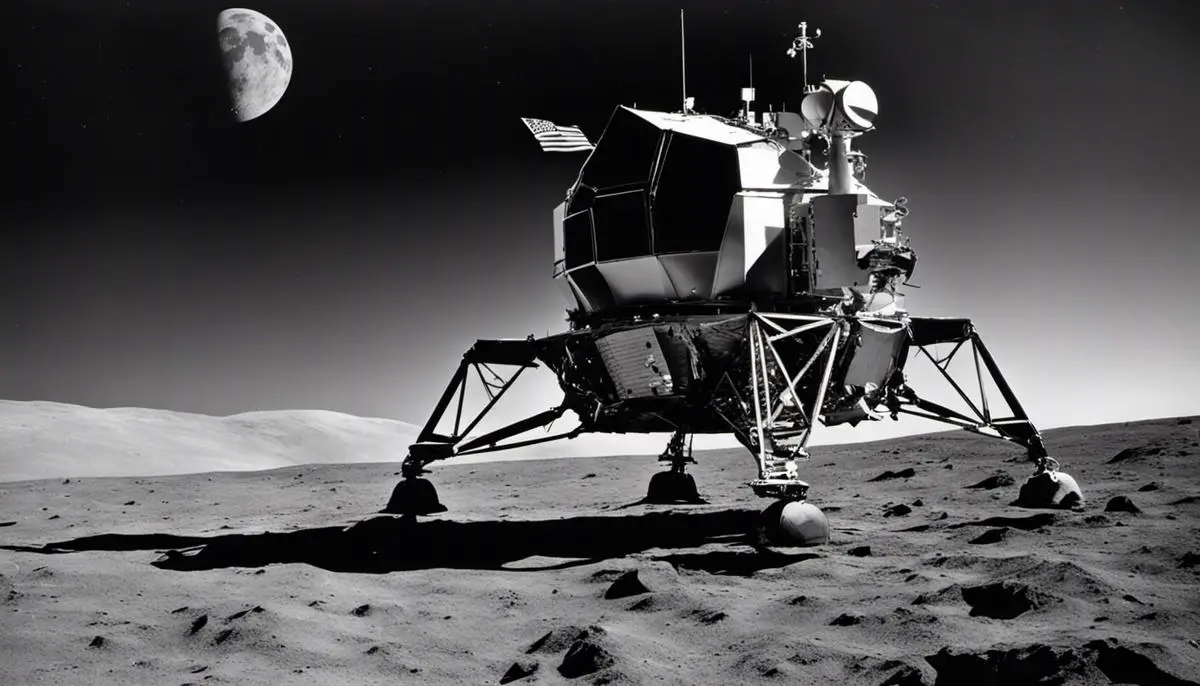
Moon Landing imprints on Literature and Music
Examining the ripple effect of the moon landing on various aspects of human culture, it is crucial to highlight how profoundly it insinuated itself into the realm of literature and music. Since these fields stand at the pinnacle of human creative expression, the lunar exploration program has spurred a wave of inspired output, stimulating a unique, newfound introspective vision about our existence in the universe.
Consider, for instance, the significant impartation on the speculative fiction genre, where authors traversed boundaries of our earthly ken to weave dreamed-up narratives of astral forays and cosmic vistas. Post-1969, the moon was no longer uncharted territory, a far-flung phantom landscape, but terra firma of human triumph. The lunar landing served to ground and embolden these celestial-exploration narratives in the annals of literary output, bestowing them a newfound veracity previously unheard of. Intriguingly, reality and fiction intertwined, fostering the evolution of ‘hard’ science fiction, which extrapolated current scientific understanding into hyper-realistic future scenarios.
The moon landing unleashed not only a torrent of literary output but equivalently ignited a revolution in the music industry. The sphere of cosmic guided pop, rock, and folk music into unexplored territories, both thematically and sonically. David Bowie’s ‘Space Oddity,’ released mere days before Apollo 11’s liftoff, epitomizes this phenomenon, merging human emotional complexity with the starkness of space isolation. Furthermore, the pioneering use of electronic synthesizers, emulating celestial sounds, played a pivotal role in shaping the genre of psychedelic and progressive rock, enriching musical texture and versatility.
Moreover, the moon landing has assisted in shaping narratives around international cooperation and peace. Literature started showcasing earthlings, transcending national interests, working harmoniously to navigate the challenges of cosmic colonization. Examples of this can be seen in Arthur C. Clarke’s ‘2010: Odyssey Two’ and Carl Sagan’s ‘Contact’. These narratives have been prominent, echoing the global unity the first moon landing inspired.
Lastly, the moon landing has infiltrated television, making cameos in various sitcoms and dramas, often with a comedic or satirical slant. This usage underscores the landing’s societal impression, serving as a cultural touchstone that needs no explanation. The iconic dialogue, as delivered by Neil Armstrong, has etched itself in the public consciousness, echoed in countless artistic expressions across multiple genres, music, and literature included.
No matter what the perspective, it’s evident that the moon landing’s influence on literature and music has been far-reaching, changing landscapes in more ways than one. This monumental occasion not only inspired generations to look upward and dream but shaped an entire cultural ethos that continues to imbue its impact in countless subtle and poignant ways.
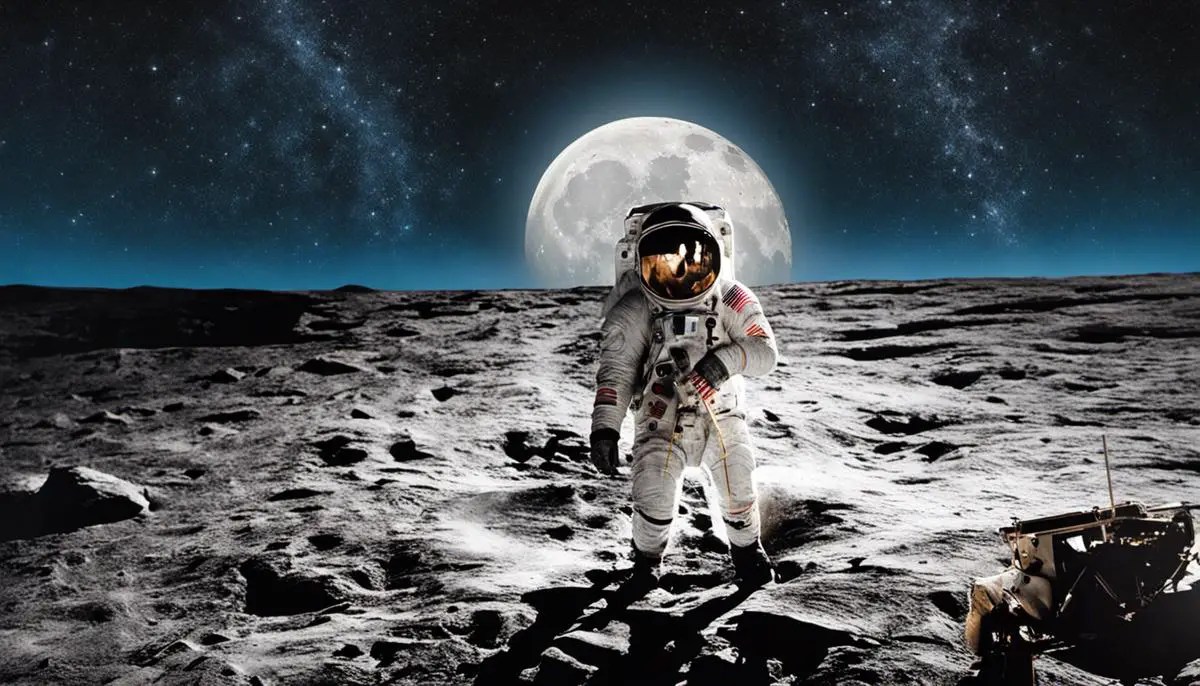
Moon Landing in Recent Culture
Venturing deeper into the realm of pop culture, the lunar landing has profoundly shaped the trajectory of speculative fiction.
An emergent realm of literature and popular media, speculative fiction supposes what the world could look like based on potential future scientific discoveries or societal development.
The historicity of the lunar landing, a milestone that seemed nearly unattainable for generations past, has imbued a sense of courage and grandiosity into authors who dare to imagine ambitious technological advancements and human achievements in their narratives.
One significant by-product of the lunar landing’s influence on pop culture is the evolution of ‘hard’ science fiction, a sub-genre that adheres to rigorous scientific realism.
With actual of footage of humans setting foot on extra-terrestrial terrain, creators could no longer afford to be lax in their portrayals of space-related concepts.
This led to a surge in works that prioritized scientific accuracy and feasibility such as Andy Weir’s “The Martian” and the landmark film “2001: A Space Odyssey”.
Moreover, the moon landing also influenced the music industry, notably pop, rock, and folk music.
There was a trend of incorporating references to space exploration within popular lyrics, further solidifying the theme in the public collective consciousness.
The advent of electronic synthesizers, inspired by the technological feats like the moon landing, reshaped genres such as psychedelic and progressive rock.
Bands like Pink Floyd with their album “Dark Side of the Moon” and Elton John with his famous track “Rocket Man” symbolize this trend.
In literature and storytelling at large, narratives took a turn towards international cooperation and peace, an echo of the global unity that the moon landing inspired.
This can be noted in works that combated Cold War paranoia with hopeful stories of universal cooperation, such as Arthur C. Clarke’s “2010: Odyssey Two”.
The presence of the lunar landing wasn’t confined to serious contexts – it made its way into sitcoms and dramas, serving as a comedic theme or thought-provoking plot device.
It became an easy touchstone, a reference that resonated deeply with audiences.
Notable examples include the central narrative of the television series “For All Mankind”.
In conclusion, the moon landing has, indeed, become a cultural touchstone, shaping narratives and indica of our collective imagination.
This monumental moment in human history has left an enduring mark, influencing decades after its occurrence, weaving itself seamlessly into the very fabric of popular culture.
Its imprints can be traced in the songs we hear, the books we read, the films we watch, and, most notably, in the collective human aspiration to extend the frontiers of knowledge, understanding, and achievement.
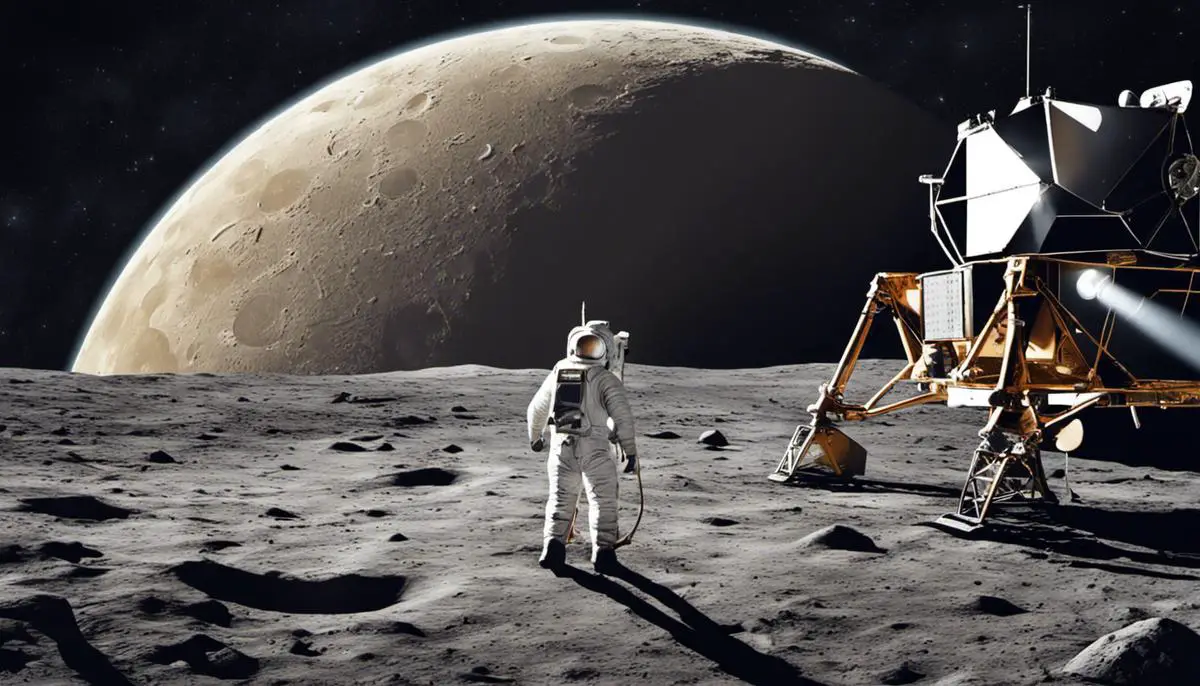
Fifty years post the moon landing, the impact of this awe-inspiring event still resonates palpably in pop culture. Its influence pervades not just the classics but continues to be a popular theme in new media, fashion, and arts, sustaining the cultural love for anything commemorating space exploration. Be it through science-fiction or real-life astronaut biographies, lunar landing inspired fashion trends or contemporary music, the allure of space and the associated sense of discovery stand as timeless themes. The moon landing, therefore, remains a potent engine powering creativity and innovation in pop culture, testament to its enduring global impact.

With a passion for unraveling the mysteries of the moon, Dr. Luna Sterling is a highly-respected astrophysicist, a dedicated lunar enthusiast, and a captivating blogger. After earning her Ph.D. in Astrophysics from the Massachusetts Institute of Technology (MIT), she served as a lead scientist and mission planner for NASA, contributing significantly to various lunar missions.
For over two decades, Luna has been at the forefront of lunar science, pushing boundaries and pioneering discoveries that have enriched our understanding of the moon’s geological history. However, it’s her infectious enthusiasm for all things lunar that truly sets her apart.
In an endeavor to bring the moon closer to everyone, Luna started her blog, “Luna’s Lens: A Closer Look at the Moon.” With this platform, she offers a unique blend of intriguing moon facts, updates on lunar missions, and personal anecdotes from her experiences in the field, all told in an engaging and accessible manner.
Luna’s unique blend of scientific expertise and warm, humorous writing style has transformed complex astrophysics into compelling narratives that captivate her audience. As a gifted communicator, she leverages her knowledge and experience to relate scientific facts to everyday life, thus making her blog a must-read for both seasoned space enthusiasts and curious newcomers.
Interactive and inviting, Luna frequently encourages reader engagement through thought-provoking discussions and a monthly ‘Ask Dr. Luna’ feature, where she personally answers questions about the moon and space exploration. A celestial storyteller at heart, Dr. Luna Sterling’s passion for the moon is as vast as the cosmos she explores, making her an invaluable beacon in the world of lunar science.
